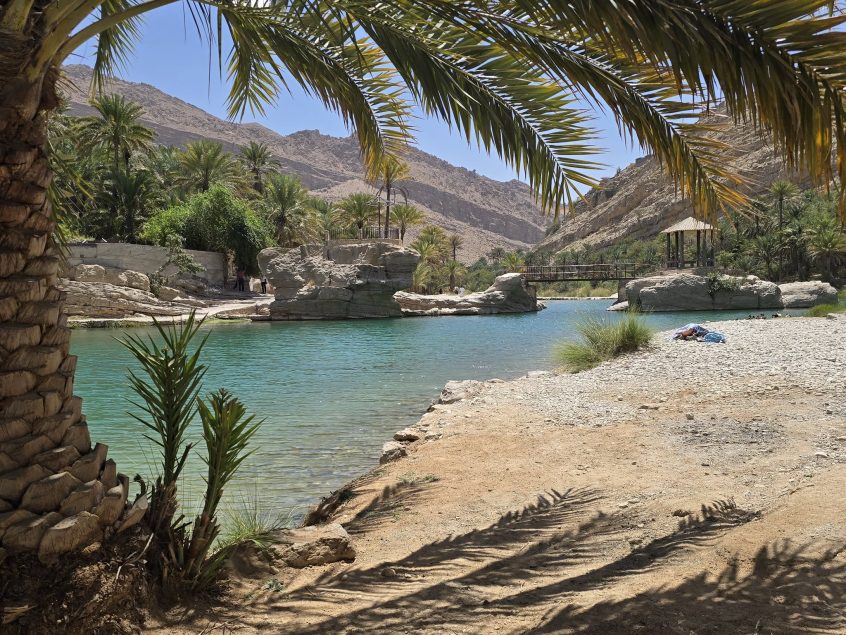Today involved even more driving than yesterday. I wasn’t the one doing the driving, but I’m still exhausted. For more than two hours we headed south through areas that became progressively less populated. We passed loads of small villages, each backing up to the mountains, with perhaps ten or twelve homes. Not only were there fewer buildings, but there was also less and less vegetation. Then, as if by magic, the landscape became lush with date palms, bushes, trees, and grasses.
We’d arrived at Wadi Bani Khalid located in the Eastern Hajar Mountains. Despite the name “wadi” (a dry riverbed) it has water year-round. I’d been told I could go swimming there and to bring a bathing suit and towel, which I dutifully packed. Yusef parked the car and directed me to a paved path. I had no idea what to expect. The trail is about a quarter of a mile. The first section bone dry. Then there was a trickle of water along the path. Shortly after that, water rushed down man-made channels. Then I spotted turquoise pools surrounded by palm trees and white rock formations. The color was startling in the desert.
A surprising number of people were there, almost all Europeans. There were also ducks, butterflies, and flowers. And many date palms shading the area.
Unfortunately, I didn’t go swimming. Why didn’t I go swimming? To get to the changing area I would have needed to climb a long, steep staircase with no rail of any kind. I simply couldn’t manage it. Still, I enjoyed the breeze, gorgeous views and dipping my toes into the cool, refreshing water.
Back in the car, Yusef drove for another 90 minutes into the desert. The land became more parched looking and homes further apart. Our destination was a Bedouin family compound. The pavement ended and we drove about half a mile on the sand. Next time there will be asphalt the entire way, road crews were busy building a new road.
The home belongs to a Bedouin family, but when I asked about it the truth about it being their home was somewhat different. This is their winter compound and where the family’s camels live. When it gets hot, they move to their home in town which has air conditioning.
According to Yusef there are almost no Bedouins who live in the desert anymore. They keep their camels there and perhaps go out to spend an evening and have a barbecue, but it isn’t full time. The camels are sold for racing and for food.
Then it was back in the car for the long drive into Muscat. The drive was on a road that is about two years old. Yusef was quite proud of it, it cut the time for the drive from four hours to two. It still felt like a long drive.

